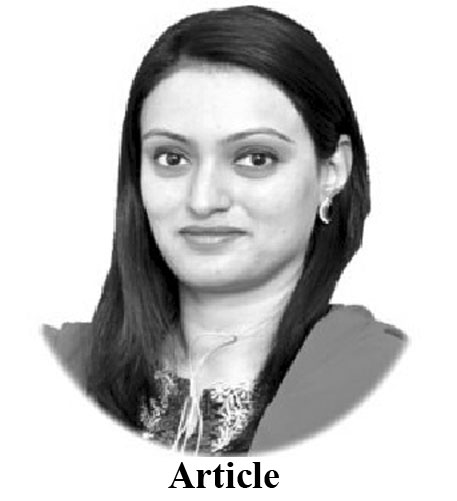Reema Shaukat
INDIA in its pursuit of mission Kashmir is doing whatever possible and now the new developments are coming up with the establishment of Delimitation Commission for Jammu and Kashmir under the Indian Law Ministry which will seek nominations for the panel from the Election Commission of India and the new Union Territory. The EC of India has nominated Sushil Chandra as the Commissioner for this delimitation exercise while other members still to be decided. While it will be chaired by a retired Supreme Court judge, it is announced that the centre has begun shortlisting names and will notify the Delimitation Commission soon. After this so-called formation of Commission, India is hoping to have next round of elections in J&K so this delimitation process is completed which will draw new boundaries and size of constituencies on the basis of the 2011 census. The EC was holding meetings since August 2019 when India abrogated the special status of J&K through Articles 370 and 35-A and after passing it from the Indian Parliament it started the work out on Delimitation Commission which it announced recently and Indian Ministry of Home Affairs is behind all this new venture.
Now the real debate starts with this new Indian game as India defines this delimitation as the process of fixing limits or boundaries of territorial constituencies within a country or a province with a legislative body. First by considering illegal occupation of Kashmir as legal, and considering its own territory it is taking pride in making such announcements. Secondly it appears another anti-Kashmir move after the revocation of its special status preserved in the Indian constitution under Article 370, New Delhi is going to play with the Muslim majority stature of occupied Jammu and Kashmir in the name of delimitation of Assembly constituencies. Thirdly, India now taking leverage on the name of redrawing the boundaries, may appoint some RSS follower with a certain mind-set to deprive Muslim majority population of its rights. After revoking the Article 370, this seems another attempt to suppress Muslim majority in Kashmir by stopping them from reaching the Constituent Assembly.
The voices which were supposed to be heard in assemblies were tried to be bottled-up this way as now mostly and can be clearly speculated that it will be governed by the Hindu leaders. Indian media itself is reporting about this and political analysts who have a close watch on the Narendra Modi government’s anti-Kashmir and anti-Muslim policies, say ‘the fresh move is aimed at thwarting the Muslim dominant character of the Kashmir Valley in the assembly through gerrymandering’. After all these developments taking place within span of a few months and where inside India public is against the citizen amendment bill, seems India has truly taken a path of losing its so-called secular ideology, a path of self-destruction which Modi has adopted by calling himself Chowkidar and thinks he will be able to achieve desired popularity. Recently, in a meeting in Varanasi Modi said ‘he is doing all this without any pressure and country waited more than three years for this decision’. After the announcement of new Commission, BJP Kashmir chief Ravinder Raina said that “The BJP is hopeful of getting its ‘first Chief Minister’ in Jammu and Kashmir following the abrogation of Article 370, and the planned delimitation of the Assembly constituencies”. According to the Delimitation Commission Act, the Delimitation Commission appointed by New Delhi has to have three members: a serving or retired judge of the Indian Supreme Court as the chairperson, and the Chief Election Commissioner or Election Commissioner nominated by the CEC and the Indian Occupied J&K Election Commissioner as ex-officio members. Some media sources are reporting that though the Commission has been announced by Modi government but practically they have a difficult task to achieve as the census is due to be carried out. Before the constitutional reorganisation of the state, Jammu & Kashmir had 87 seats in the Lower House including four seats for Ladakh region, which is now a separate Union Territory without a Legislative Assembly. The delimitation exercise will effectively grant 90 seats to Kashmir and Jammu regions, which in the previous arrangement together had merely 59. Top sources said, within the BJP, there is a demand of 50 seats for Jammu region due to massive migration into Jammu from the Kashmir Valley in the last 30 years. The delimitation plan is facing hindrance also because there is a view within the government that both population and area should be taken into account to redraw the boundaries of constituencies.
So Modi-led BJP centric government by design is carrying out such changes in the political set up of Indian Occupied Kashmir where apart from demographic changes, it is trying to penetrate in the political structure from where it can govern the prisoned Kashmiris. India before making changes in its constitution deployed more than 40,000 armed troops in the IoK. Already India has deployed armed troops in territory over the years and according to some statistics Indian forces deployed in Kashmir cross the figure of one million and have been given Special Powers to kill innocent people. But Modi government never thought of persisting resistance from Kashmiris who demand for their right of self-determination. Modi thought of some other plans for Kashmir in perusal of which it is making constitutional changes, but it can never undermine or deter the will and resilience of innocent Kashmiris who are fighting for their basic rights under the illegal Indian occupation.
— The writer works for Pakistan Institute for Conflict and Security Studies, a think-tank based in Islamabad.









